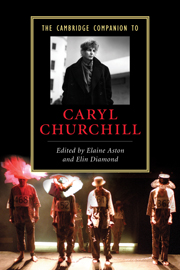Book contents
- Frontmatter
- 1 Introduction: on Caryl Churchill
- 2 On feminist and sexual politics
- 3 On owning and owing: Caryl Churchill and the nightmare of capital
- 4 On the challenge of revolution
- 5 On text and dance: new questions and new forms
- 6 On Caryl Churchill’s ecological drama: right to poison the wasps?
- 7 On performance and selfhood in Caryl Churchill
- 8 On Churchill and terror
- 9 On collaboration: ‘not ordinary, not safe’
- 10 On Churchill’s influences
- Select bibliography
- Index
4 - On the challenge of revolution
Published online by Cambridge University Press: 28 March 2010
- Frontmatter
- 1 Introduction: on Caryl Churchill
- 2 On feminist and sexual politics
- 3 On owning and owing: Caryl Churchill and the nightmare of capital
- 4 On the challenge of revolution
- 5 On text and dance: new questions and new forms
- 6 On Caryl Churchill’s ecological drama: right to poison the wasps?
- 7 On performance and selfhood in Caryl Churchill
- 8 On Churchill and terror
- 9 On collaboration: ‘not ordinary, not safe’
- 10 On Churchill’s influences
- Select bibliography
- Index
Summary
Caryl Churchill has shown a sustained interest in the inter-connections between self-definition, identity politics and revolution. In her career she has repeatedly examined revolutionary conditions, and engaged ambitiously with the artistic dilemma of how to represent political turmoil on stage. This chapter investigates three of her plays about revolution: The Hospital at the Time of the Revolution, Light Shining in Buckinghamshire and Mad Forest. /The Hospital at the Time of the Revolution / Hospital was written in 1972 though, inexplicably, it has never been staged. It draws on the writings of the celebrated psychiatrist and champion of the Algerian struggle for independence, Frantz Fanon, who was an inspirational figure not just for black revolutionaries but also for Churchill's generation of white, western political radicals in the 1960s. The decolonization of Africa followed Indian independence in 1947, and when, in 1960, seventeen former African colonies became independent members of the United Nations, it marked a turning point in the post-war world, re-mapping power relations between Europe and Africa. The Algerians' fight for autonomy was particularly complex since French occupation dated from 1830 and French trade and investment in Algeria had matched economic commitments in all of France's other imperial territories combined. French emigration to Algeria had far exceeded the scale of emigration to other French colonies and colonial legal policy even upheld that Algeria was an integral part of France - an ideological position that created a panoply of contradictions and paradoxes.
- Type
- Chapter
- Information
- The Cambridge Companion to Caryl Churchill , pp. 52 - 70Publisher: Cambridge University PressPrint publication year: 2009
- 4
- Cited by

